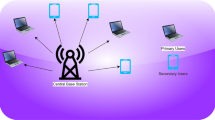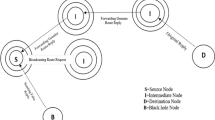Abstract
Anti-collision protocols have long been an important research field in RFID systems, and the collision tree (CT) protocol is very typical. Some researchers have improved CT to achieve better performance. However, these schemes still encounter the problem of too many collisions occurring at the beginning of the tags identification. In order to reduce the initial redundant collision, we propose a Probability-based Query Tree protocol (PQT). PQT divides all tags into several small subsets before the tags to be identified, and the protocol is composed of three parts: Inverse Probability Function (IPF), Total Time Slot Function (TTSF), and Mapping Table. The inverse probability function quantifies the possibility that a subset contains tags. The total time slot function measures the number of total time slots, and is used to obtain an optimal position to divide tags in the beginning. The mapping table is presented as an adaptive method in practical applications. In performance analysis, the identification efficiency of PQT is close to the optimal value. Simulation results further show that PQT outperforms the other existing anti-collision protocols.











Similar content being viewed by others
References
Ahuja, S., & Potti, P. (2010). An introduction to RFID technology. Communications and Network, 2(3), 183–186.
Sarac, A., Absi, N., & Dauzère-Pérès, S. (2010). A literature review on the impact of RFID technologies on supply chain management. International Journal of Production Economics, 128(1), 77–95.
Liu, X., Li, K., Liu, A. X., Guo, S., Shahzad, M., Wang, A. L., et al. (2017). Multi-category RFID estimation. IEEE/ACM Transactions on Networking, 25(1), 264–277.
Zou, Y., Xiao, J., Han, J., Wu, K., Li, Y., & Ni, L. M. (2017). GRfid: A device-free RFID-based gesture recognition system. IEEE Transactions on Mobile Computing, 16(2), 381–393.
Atzori, L., Iera, A., & Morabito, G. (2010). The Internet of Things: A survey. Computer Networks, 54(15), 2787–2805.
Welbourne, E., Battle, L., Cole, G., Gould, K., Rector, K., Raymer, S., et al. (2009). Building the Internet of Things using RFID the RFID ecosystem experience. IEEE Internet Computing, 13(3), 48–55.
Rennane, A., Saadi, H., Touhami, R., & Yagoub, M. C. E. (2012). A comparative performance evaluation study of the basic binary tree and aloha based anti-collision protocols for passive RFID system. In: Proceedings of 2012 24th international conference on microelectronics, Dec. 2012.
Namboodiri, V., DeSilva, M., Deegala, K., & Ramamoorthy, S. (2012). An extensive study of slotted Aloha-based RFID anti-collision protocols. Computer Communications, 35(16), 1955–1966.
Wu, H., & Zeng, Y. (2011). Efficient framed slotted aloha protocol for RFID tag anticollision. IEEE Transactions on Automation Science and Engineering, 8(3), 581–588.
Felemban, E. (2012). A revisit on modeling framed slotted aloha anti-collision protocol for RFID systems. In Proceedings of 2012 IEEE international conference on RFID-technologies and applications (pp. 315–318), Nov. 2012.
Wang, H., Xiao, S., Lin, F., Yang, T., & Yang, L. T. (2014). Group improved enhanced dynamic frame slotted ALOHA anti-collision algorithm. The Journal of Supercomputing, 69(3), 1235–1253.
Lee, C., & Lin, S. (2012). A double blocking dynamic framed slotted ALOHA anti-collision method for mobile RFID systems. In Proceedings of 2012 sixth international conference on genetic and evolutionary computing (pp. 581–584), Aug. 2012.
Zhu, L., & Yum, T. P. (2010). Optimal framed Aloha based anti-collision algorithms for RFID systems. IEEE Transactions on Communications, 58(12), 3583–3592.
Nithya, S., Jerlin, M. A., & Priya, S. (2013). Tag starvation and tag collisions in RFID system—A solution. International Journal of Engineering and Technology, 5(3), 2519–2522.
Jia, X., Feng, Q., & Yu, L. (2012). Stability analysis of an efficient anti-collision protocol for RFID tag identification. IEEE Transactions on Communications, 60(8), 2285–2294.
Ryu, J., Lee, H., Seok, Y., Kwon, T., & Choi, Y. (2007). A hybrid query tree protocol for tag collision arbitration in RFID systems. In IEEE international conference on communications (pp. 5981–5986).
Kim, Y., Kim, S., Lee, S., & Ahn, K. (2009). Improved 4-ary query tree algorithm for anti-collision in RFID system. In Proceedings of 2009 international conference on advanced information networking and applications (pp. 699–704), May. 2009.
Guo, Y., Li, S., Dou, J., & Zhou, S. (2016). Deterministic cloned tag detection protocol for anonymous radio-frequency identification systems. IET Information Security, 10(1), 28–32.
Moshref, M. (2017). Improved anti-collision algorithm for tag identification in future internet of things. International Journal of Computer Network and Information Security, 9(3), 11–20.
Wu, F., Xu, L., Kumari, S., Li, X., Das, A. K., & Shen, J. (2017). A lightweight and anonymous RFID tag authentication protocol with cloud assistance for e-healthcare applications. Journal of Ambient Intelligence and Humanized Computing, 2, 1–12.
Abdolmaleki, B., Baghery, K., Khazaei, S., & Aref, M. R. (2017). Game-based privacy analysis of RFID security schemes for confident authentication in IoT. Wireless Personal Communications, 6, 1–24.
Sun, H., Su, C., & Chen, S. P. (2018). A high security RFID system authentication protocol design base on cloud computer. Wireless Personal Communications, 102(2), 1255–1267.
Xiao, Q., Xiao, B., Chen, S., & Chen, J. (2017). Collision-aware churn estimation in large-scale dynamic RFID systems. IEEE/ACM Transactions on Networking, 25(1), 392–405.
Liu, X., Zhang, S., Xiao, B., & Bu, K. (2016). Flexible and time-efficient tag scanning with handheld readers. IEEE Transactions on Mobile Computing, 15(4), 840–852.
Xie, X., Liu, X., & Li, K. (2017). Minimal perfect hashing-based information collection protocol for RFID systems. IEEE Transactions on Mobile Computing, 16, 2792–2805.
Odelu, V., Das, A. K., & Goswami, A. (2016). SEAP: Secure and efficient authentication protocol for NFC applications using pseudonyms. IEEE Transactions on Consumer Electronics, 62(1), 30–38.
Bai, Z., He, Y., & Wang, S. (2014). Research of RFID tag anti-collision algorithm based on binary tree. Journal of Networks, 9(9), 2543–2548.
Chen, K., & Li, B. (2013). An improved query tree anti-collision algorithm using collision location. Research Journal of Applied Sciences, Engineering and Technology, 5(8), 2494–2498.
Landaluce, H., Perallos, A., Bengtsson, L., & Zuazola, I. J. G. (2014). Simplified computation in memoryless anti-collision RFID identification protocols. Electronics Letters, 50(17), 1250–1252.
Choi, S., Choi, J., & Yoo, J. (2012). An efficient anti-collision protocol for tag identification in RFID systems with capture effect. In Proceedings of 2012 fourth international conference on ubiquitous and future networks (pp. 482–483), Jul. 2012.
Jia, X., Feng, Q., Fan, T., & Lei, Q. (2012). Analysis of anti-collision protocols for RFID tag identification. In Proceedings of 2012 2nd international conference on consumer electronics, communications and networks (pp. 877–880), Apr. 2012.
Landuluce, H., Perallos, A., & Angulo, I. (2014). Managing the number of tag bits transmitted in a bit-tracking RFID collision resolution protocol. Sensors, 14(1), 1010–1027.
Lai, Y. C., Hsiao, L. Y., & Lin, B. S. (2015). Optimal slot assignment for binary tracking tree protocol in RFID tag identification. IEEE/ACM Transactions on Networking, 23(1), 255–268.
Pan, L., & Wu, H. (2011). Smart trend-traversal protocol for RFID tag arbitration. IEEE Transactions on Wireless Communications, 10(11), 3565–3569.
Guo, H., Leung, V. C. M., & Bolic, M. (2012). M-ary RFID tags splitting with small idle slots. IEEE Transactions on Automation Science and Engineering, 9(1), 177–181.
Shao, M., Jin, X., & Jin, L. (2014). An improved dynamic adaptive multi-tree search anti-collision algorithm based on RFID. In Proceedings of 2014 international conference on data science and advanced analytics (pp. 72–75), Nov. 2014.
Hush, D. R., & Wood, C. (1998). Analysis of tree algorithms for RFID arbitration. In Proceedings of the IEEE symposium on information theory (pp. 107–116), Aug. 1998.
Zhang, L., Zhang, J., & Tang, X. (2013). Assigned tree slotted Aloha RFID tag anti-collision protocols. IEEE Transactions on Wireless Communications, 12(11), 5493–5505.
Zhang, W., Guo, Y., Tang, X., Cui, G., Wu, L., & Mei, Y. (2013). An efficient adaptive anticollision algorithm based on 4-ary pruning query tree. International Journal of Distributed Sensor Networks, 9, 1–7.
Landaluce, H., Perallos, A., & Angulo, I. (2013). Influence of managing the number of tag bits transmitted on the query tree RFID collision resolution protocol. Journal of Communications Software and Systems, 9(1), 35.
Yan, X. Q., Liu, Y., Li, B., & Liu, X. M. (2015). A memoryless binary query tree based successive scheme for passive RFID tag collision resolution. Information Fusion, 22, 26–38.
Jayadi, R., Lai, Y., & Li, C. (2017). Efficient time-oriented anti-collision protocol for RFID tag identification. Computer Communications, 112, 141–153.
Bagheri, N., Alenaby, P., & Safkhani, M. (2017). A new anti-collision protocol based on information of collided tags in RFID systems. International Journal of Communication Systems, 30(3), e2975.
Fu, Y., Wang, X., Wang, E., & Qian, Z. (2017). A bit arbitration tree anti-collision protocol in radio frequency identification systems. International Journal of Distributed Sensor Networks, 13(11), 155014771774157.
Wei, W., Su, J., Song, H., Wang, H., & Fan, X. (2018). CDMA-based anti-collision algorithm for EPC global C1 Gen2 systems. Telecommunication Systems, 67(1), 63–71.
Cmiljanic, N., Landaluce, H., Perallos, A., & Arjona, L. (2017). Influence of the distribution of tag IDs on RFID memoryless anti-collision protocols. Sensors, 17(8), 1891.
Zhang, Y., Yang, F., Wang, Q., He, Q., Li, J., & Yang, Y. (2017). An anti-collision algorithm for RFID-based robots based on dynamic grouping binary trees. Computers & Electrical Engineering, 63, 91–98.
Chen, B., Zhou, Z., & Yu, H. (2016). Understanding RFID counting protocols. IEEE/ACM Transactions on Networking, 24(1), 312–327.
Shakiba, M., Singh, M. J., Sundararajan, E., Zawari, A., & Islam, M. T. (2014). Extending birthday paradox theory to estimate the number of tags in RFID systems. PLoS ONE, 9(4), e95425.
Author information
Authors and Affiliations
Corresponding author
Additional information
Publisher's Note
Springer Nature remains neutral with regard to jurisdictional claims in published maps and institutional affiliations.
Rights and permissions
About this article
Cite this article
Liang, X., Guo, Y. A Probability-Based Anti-Collision Protocol for RFID Tag Identification. Wireless Pers Commun 107, 57–79 (2019). https://doi.org/10.1007/s11277-019-06240-1
Published:
Issue Date:
DOI: https://doi.org/10.1007/s11277-019-06240-1




